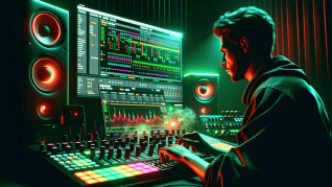Artificial intelligence is fundamentally changing music creation, composition, and distribution. As a powerful tool in the creative world, AI is driving new forms of musical innovation, altering how artists, producers, and listeners engage with music. Here’s a look at how musical evolution might progress in the age of AI.
1. New Forms of Composition and Collaboration
AI composition tools, such as OpenAI’s MuseNet and Google’s Magenta, enable artists to explore unique sounds and styles. With AI, musicians can generate melodies, harmonies, and even lyrics in seconds, expanding creative possibilities. These tools can analyze vast amounts of music data, drawing from various genres and artists to inspire compositions that artists may not have thought of independently.
2. Personalized Music and Adaptive Playlists
AI-driven platforms like Spotify and Apple Music are already customizing playlists based on listeners’ preferences. But future AI could take this a step further, creating unique songs tailored to individual preferences in real-time. With the capability to analyze emotional tone, personal listening history, and environmental factors, AI could generate a song that perfectly matches each listener’s moment.
3. Enhanced Accessibility for Aspiring Musicians
AI tools simplify music production by breaking down barriers for those who may not have a formal musical background. With AI-powered instruments, anyone can learn to play, compose, and produce music. This opens the door to a more diverse range of music creators and fosters a new wave of genre-blending artists from all walks of life.
4. Music Preservation and Cultural Fusion
AI can help preserve and reimagine traditional music by analyzing, cataloging, and interpreting different musical styles and cultures. By recreating the sounds and styles of past eras, AI might revive forgotten musical traditions while blending them with modern techniques. This cultural fusion could lead to new genres, shaped by both historical and futuristic influences.
5. Ethics and Authenticity in Music Creation
Rauf Hameed says the growth of AI in music raises questions about the authenticity of music and who owns creative rights to AI-generated work. As AI-generated songs grow indistinguishable from human-composed pieces, listeners and creators will need to define the boundaries of creative ownership and explore how AI can ethically coexist within the industry.
In sum, AI is set to redefine the musical landscape, blurring the line between human and machine artistry. As these technologies develop, they will foster an unprecedented era of creativity, accessibility, and innovation, pushing the evolution of music into exciting, uncharted territories.
